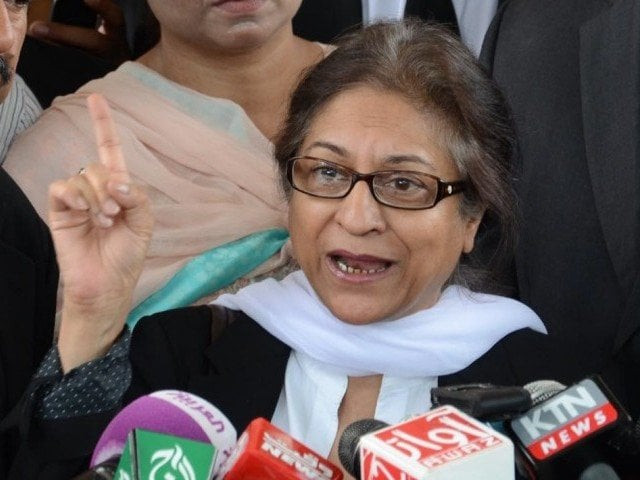Asma Jahangir: exit no, voice yes
For Asma, no cost was high enough when it came to civil liberties and political rights

Asma Jahangir's proclivity to act instantly left no time for perversity to prevail. PHOTO: INP
I could not bring myself to writing about Asma Jahangir until now. One had not yet recovered from the shock of Munoo Bhai’s departure. Such was the state of mind that, except for the funeral, I failed to attend any of the functions held in her honour. Perhaps the economist in me was waiting for encouragement from Amartya Sen for whom “it was hard to find a measure of Asma Jahangir’s greatness.” Another distinguished economist, Albert Hirschman, had written a book at around the time Asma was growing up, that had a rather noneconomic title, Exit, Voice, and Loyalty. Development economics had not yet heard of rights-based development, the subject of an annual review that I was asked to do for many years by I A Rehman for the Human Rights Commission of Pakistan co-founded by Asma.
What do citizens do when faced with an utterly unsatisfactory state of affairs? They could just exit, voting with their feet. This is what many chose to do by migrating to other countries during the tyrannical regime of General Ziaul Haq. Not Asma, who was out on the roads to protest the Hudood Ordinance, displaying what Amartya described as “her deep-rooted courage.” Not a leftist like Munoo Bhai, she took the option of what Hirschman called Voice. Instead of exiting, the citizen can face up to it by raising their voice. Voice led to the emergence of a vibrant civil society. Again, voice arouses support, reciprocity or what Hirschman called loyalty. Out of the voice against Hudood Ordinance was born the Women’s Action Forum (WAF). She fought and won a case against a military usurper of power well before becoming a lawyer in the famous Asma Jillani case. Once a lawyer, she doggedly defended the rights of children, minorities, workers, tenants, social pariahs, political outcasts, constitutionally alienated, victims of blasphemy charge and religious bigotry. Her voice was also for those who were opposed to her. They were all there at her funeral. She personified the old adage: “I disapprove of what you say, but I will defend to the death your right to say it.”
Hirschman deconstructed the rhetoric of reaction against reform in three ways. First, it may have the perverse effect of harming the very people intended to benefit from it. This was the common fear in cases related to blasphemy and rights of women. Asma’s proclivity to act instantly left no time for perversity to prevail. Secondly, it would be futile to act as the perceived high cost will only cause it to fail. For Asma, no cost was high enough when it came to civil liberties and political rights. She would up the ante before anyone could count the cost. The MRD movement, the Lahore marathon are just two examples. Finally, the rhetoric of reaction is that reform will jeopardise something else of value. Asma resisted judicial activism and democracy-corruption bracketing to counter this jeopardy.
Published in The Express Tribune, March 2nd, 2018.
Like Opinion & Editorial on Facebook, follow @ETOpEd on Twitter to receive all updates on all our daily pieces.














COMMENTS
Comments are moderated and generally will be posted if they are on-topic and not abusive.
For more information, please see our Comments FAQ